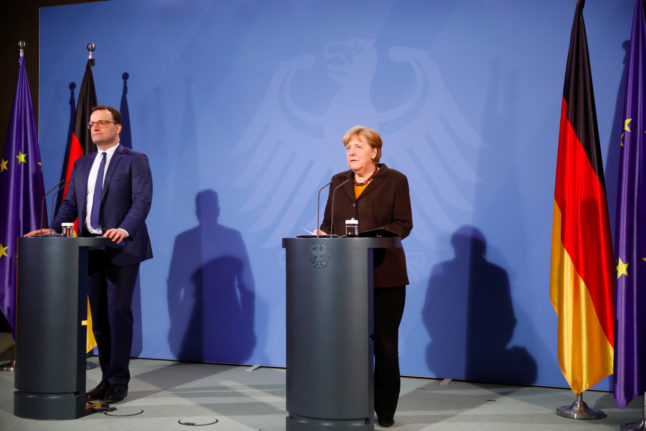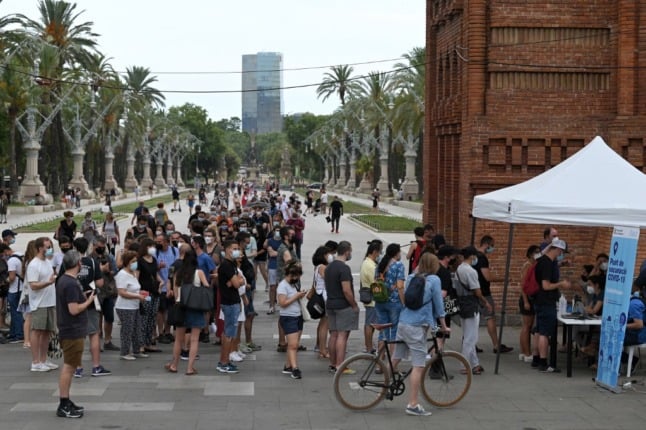During a press conference with Health Minister Jens Spahn on Tuesday, Merkel said that experts have recorded in recent weeks “very rare but very serious cases of thrombosis” in people vaccinated with AstraZeneca.
“They are findings that (Germany’s vaccine commission) and finally us, cannot ignore,” she said.
Germany’s vaccine commission known as STIKO earlier Tuesday recommended that use of the jabs be halted for under-60s because of “currently available data on the occurrence of rare but very severe thromboembolic side effects” in younger vaccinated people.
READ ALSO: Germany restricts use of AstraZeneca jabs for under 60s
It intends to make another recommendation by the end of April on how to proceed with people under 60 who have already received a first dose of the vaccine, it said.
Pending this decision, ministers said people who are due for their second jab can either choose to take it if cleared by their attending doctor, or they can opt to wait for the commission to make its recommendation.
Under-60s can still decide to take the vaccine but only following “consultation with the doctor carrying out the vaccination … and with an individual risk analysis,” said ministers of Germany’s 16 states and Spahn in a policy statement earlier on Tuesday.
‘Openness and transparency’
“All this will bring uncertainty,” said Merkel when asked about a possible loss of confidence in the vaccine in Germany. “But openness and transparency are the best way to deal with such a situation.”
“Trust stems from the knowledge that every suspicion, every individual case will be examined,” she said.
Germany’s medicines regulator, the Paul Ehrlich Institute (PEI), has now reported 31 cases of blood clots in people who have received AstraZeneca, Der Spiegel magazine reported on Tuesday.
Almost all cases are reportedly in younger and middle-aged women, prompting several German hospitals to suspend the use of the jab for women under 55 this week.
Germany has come under fire for its sluggish vaccination campaign.
Spahn stressed that Germany still expects to offer every adult a coronavirus jab by the end of the summer on September 21st.
“If delivery pledges are kept to and all vaccines receive their approvals as planned,” then Europe’s biggest economy would be able to vaccinate its population “by the end of summer”, said Spahn.
Spahn acknowledged that the development was “without question a setback” for the inoculation rollout. But he said the AstraZeneca vaccine was still “very effective” and could now be used more quickly in the over 60s age group.
The World Health Organization and the EU’s health watchdog have both deemed the AstraZeneca vaccine safe, but several countries have restricted its use over clotting fears.
READ ALSO: AstraZeneca vaccine ‘safe and effective’ against Covid-19, European Medical Agency concludes
In mid-March Germany and other countries temporarily stopped the use of the jab for an investigation into blood clots – before resuming with it.
The jab was also initially recommended only for under 65s as Germany said it lacked sufficient data on how effective it was for older people. But there was a U-turn on this decision in early March.



 Please whitelist us to continue reading.
Please whitelist us to continue reading.
Pathetic
One does have to wonder if there’s more than just a medical element to the constantly shifting advice on the AZ vaccine. First Merkel told the media she was too old for the vaccine, and now it seems she’s too young. First there was Continental criticism of the effectiveness of the jab, yet then Brussels threatened to sue unless the EU got more of it. Now, unused stocks are piling up, especially in Italy because the public don’t want it after politicians have cast doubts on its safety. And throughout all this, the parallel results for things like blood clots in the Pfizer vaccine are never reported. No wonder folk are confused. My step-daughter in Köln, aged 30, has had her first dose of AZ during one of the windows when it was approved and yet now she’s been left full of doubt as to the wisdom of having accepted this vaccine in the first place and second, if she wants the second dose, whether it’ll even be available. One is left thinking that this has all been tragically mishandled.